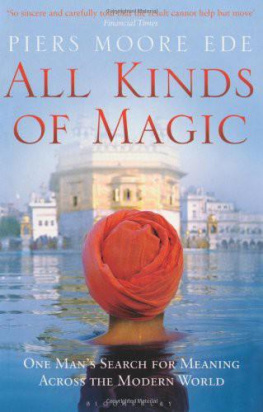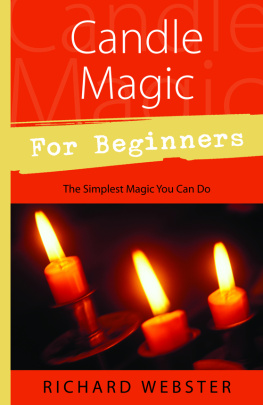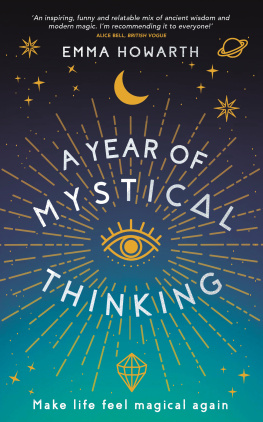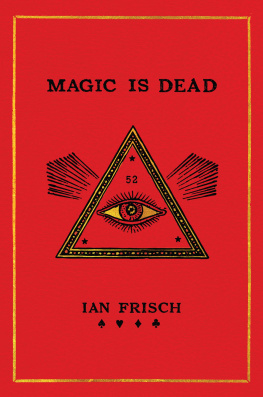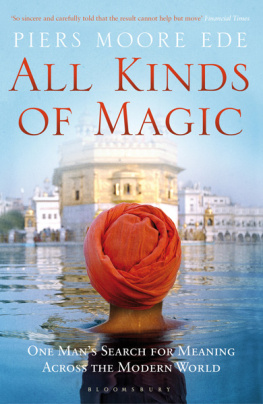
ALL KINDS OF MAGIC
A Quest for Meaning in a Material World
Piers Moore Ede

Piers Moore Ede has worked as a farmer, boat driver, surfing instructor, poetry teacher and baker. He has travelled widely, and contributed to many literary, travel and environmental publications including the Daily Telegraph , the Times Literary Supplement , Ecologist , Traveller and Earth Island Journal . He is the author of Honey and Dust , winner of a D.H. Lawrence Prize for Travel Writing.
Contents
For my parents
All kinds of magic are out of date and done away with, except in India, where nothing changes in spite of the shiny, top-scum stuff that people call civilization. (Rudyard Kipling, Plain Tales from the Hills )
From the parapet, I looked down on to a vast plain, ringed at its far edge by mountains. There were no animals, only a few stunted trees. In this low-oxygen world, there wasnt even enough moisture in the air for snow to fall. Sheltered from the rain-bearing clouds of the Indian monsoon by the Great Himalaya, only a portion of Ladakh receives snowfall. Today it was minus fifteen, so cold it burned.
On the edge of the plain, a lone monk ascended the zigzag path. He walked methodically, hands clasped behind his back. I imagined him chanting, as monks are trained to do, a mantra to keep his mind empty. Om Mane Padme Hum. Om Mane Padme Hum. Om Mane Padme Hum .
Behind me, the long rumbling blast of the zangstung , an eight-foot-long copper horn, told me something was happening. Turning, I saw that the crowd hundreds of villagers who had flocked here for this winter festival had fallen still, and were looking fretfully up at the highest parapet of the monastery. They wore long homespun robes of maroon and ochre, some of the women sporting turquoise and coral headdresses known as peraks . Eyes blinked fast in the Himalayan light. Dark skin, deeply wrinkled from altitude, faces frowning in apprehension.
Soon, the oracles will come, whispered a Ladakhi child to her mother in front of me. She crouched fearfully in her mothers skirts, pink cheeks sucking in air.
These oracles were the reason I was here. For hundreds of years, monks that live in this remote Shangri-La have maintained a practice which may come from shamanism, the tradition of lhabas : oracles who enter trance states to commune with spirits and demons. There are many oracles in Ladakh, both villagers and monks, but none are considered as powerful as the ones I was about to see. For the previous three months, the two monks who provide the vehicle for the spirits had meditated silently in a remote cave. Once a day a meal was left outside the cave mouth and, for a time, the monks uncrossed their legs to eat and perform ablutions. Then they began again. Any less discipline than this, it is claimed, and they may lack the strength to carry the spirits. Failure can result in madness or physical collapse, perhaps even death.
But in these states, the Ladakhis believe, great knowledge and wisdom can be found. The oracles come into contact with the chos skyong , a group of deities assigned to protect Tibetan Buddhists against adversaries. They can be wrathful and assume a terrifying disposition. But if the medium is able to placate the deity, and the right offerings are made, he may learn things outside the human order entirely: the method to win battles and triumph over enemies, the ability to cure the most serious diseases, even knowledge of the future.
Much of this information came to me through a young monk, Khedup, whod approached me that morning, beaming behind his hand-cut John Lennon glasses. He was studying to be an amchi , a traditional Tibetan doctor, but said that in order to gain entrance to the famous medical college in Darjeeling, he must first practise his English. It was good fortune for both of us, for without Khedup I would have understood little of all this. Tibetan Buddhism is, at best, a highly esoteric religion. But of its oracles, even less is known. Like the miraculous saints of the Catholic tradition, opinions about them remain divided, the modernists embarrassed by this link to a mystic past.
Why are the villagers so nervous? I asked Khedup.
Oracles are very powerful, he said, scanning the monastery parapet again, as more zangstung lowed their eerie notes. They are like wild animals, but with the strength of ten men. No one can control them. But there is one more thing people fear, he added. When the oracles first appear today, if they are wearing a red ribbon on their heads it will mean something very bad for us in the coming year. A warning.
What kind of thing?
Famine or war. Perhaps some natural disaster. The oracles see things beyond our own sight.
Above us, the final horn blast died out. In a second, the entire courtyard of Matho monastery had fallen silent; not a single cough. Hundreds of villagers peered upwards, some of them shielding their eyes with weathered hands.
The oracles had arrived.
As a child, I was fascinated by magic. Wardrobes whose backs invited access to Narnia. Arabian carpets which flew. Magi who could summon storms with a gesture of their hands. In old houses I would knock, occasionally, upon the backs of old wardrobes, anxious for the crunch of snow under my feet.
Aged seven, all of that changed. Knowledge, as Francis Bacon once said, is power or at least that was the way my mother had intended it. Shed told me about Father Christmas in case I found out inadvertently at school, believing that the truth would come better from her than in the schoolyard. In my case, however, the overwhelming feeling was one of disempowerment, loss of possibility, a kind of grave disappointment. It wasnt the deception that bothered me so much as the fact that, without magic, the world was suddenly intensely mundane. Behind the curtain, the Wizard of Oz was just a man moving levers, and it made me feel for want of a better metaphor like a priest disillusioned of his faith.
By my twenties, Id come to accept the muted normality of things. In the wake of magic there were job ladders to climb, health insurance forms, the myriad distractions of city life. I put my shoulder to the wheel like everyone else, and yet even as I went through the motions, something was whispering in the back of my mind: a gnawing hunger for more. There was nothing I could put my faith in amongst all this. Nothing that provided significance and meaning. I was part of a generation sated by more material wealth than any before us in history, yet I felt a starving of the spirit.
For a long time I disregarded this feeling, or merely tried to blot it out through ever more elaborate mechanisms of escape. I travelled as much as possible, always convinced that the truly unique place was around the corner. I was that quintessential late-twentieth-century vagrant: arriving on one tiny atoll after another, looking for the lost Eden that would match the one I had in my head.
Music was another distraction. I collected records obsessively, and spent a good portion of my time in private communion with the recordings of long-dead jazz musicians. Somehow, the notes had the capacity to lift me up beyond the ordinary world, to a place where I was no longer hungry. Books and films also had this power and I sucked them in voraciously, finding temporary reprieve from my restlessness in one kind of narrative or another. But when the book ended, or the song, there was my mind again, never satisfied with the moment.
After I survived a major hit-and-run accident at the age of twenty-five, the restlessness became something more serious. Having stared death in the face, I found the futility of my daily existence unbearable. Unable to find purpose in anything, I spiralled into a depression that left me cut off from friends and family, unable to enjoy the tastes of food or to feel any hope for the future. For months I scarcely left the house, numbing reality with whatever tools I had available. I felt like a spectre trapped in a human body: a ray of sunlight could pass right through me.
Next page
